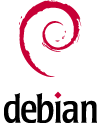MosNis-Wikibook/Installation/Betriebssystemintegration/Debian
| MosNis: Intro - Installation->:Voraussetzungen - Servergrundeinrichtung - Betriebssystemintegration-> - Debian - Wartungstoolintegration - Sonstiges - Automatisierung(AutoMosNis) - Schlusswort |
MosNis-Wikibook/Installation/Betriebssystemintegration/Debian
Inhaltsverzeichnis
Debian
Diese Aneitung beschreibt die Integration von Debian-Derivaten anhand der Version Debian Sarge 3.1v2. Andere Versionen sind adäquadt zu integrieren wobei relevante Abweichungen von diesen Angaben in den jeweiligen Menüdateien zu finden sind.
Für die Installation von Debian Sarge über das Netzwerk benötigt man zuerst den Debian-Installer für 32 Bit Systeme und den Debian-Installer für 64 Bit Systeme, da die Kernel auf den jeweiligen DVD-Versionen offenbar nicht für den PXE-Bootvorgang geeignet zu sein scheinen. Eigentlich lädt der Debian-Netinstaller die zu installierenden Pakete aus dem Internet, jedoch gibt es in der Installationsroutine ebenso die Option einen Mirrorserver explizit anzugeben, was sich natürlich für den in einem späteren Abschnitt erklärten lokalen Repository-Mirror anbietet, der dann natürlich problemlos angegeben werden kann an der entsprechenden Stelle des Installationsmenüs. Nach dem Download und Auspacken der Installer kopieren wir die Verzeichnisse schlichtweg folgendermaßen nach /tftpboot/debian-installer:
cp ./debian-installer/i386 /tftpboot/debian-installer/i386 cp ./debian-installer/amd64 /tftpboot/debian-installer/amd64
Nun brauchen wir nur noch die PXE-Menüs anzulegen und sind dann schon mit einer installationsfähigen Debian-Integration im MosNis versorgt. Die Installation komplett aus dem lokalen Netzwerk wird dann später anhand des Repository-Mirrors erläutert, so jedoch lässt sich Debian jedenfalls schonmal installieren sofern wir am Internet angeschlossen sind mit unserem LAN. Da Ubuntu auf Debian basiert und ebenso einen solchen Installer anbietet, legen wir die passende Auswahl auch direkt in der Debian-Hauptauswahl, die daher Debian-Derivate Hauptauswahl heissen wird, an.
Die Menüs
Debian 3.1v2
Die Debian-Derivate Hauptauswahl /tftpboot/DEBIAN.conf
DEFAULT menu.c32 PROMPT 0 MENU TITLE Debian-Derivate Hauptauswahl # Debian Sarge 64 Bit LABEL DEB-S-64 MENU LABEL Debian Sarge 64 Bit Netinstaller KERNEL menu.c32 APPEND DEB-S-64.conf # Debian Sarge 32 Bit LABEL DEB-S-32 MENU LABEL Debian Sarge 32 Bit Netinstaller KERNEL menu.c32 APPEND DEB-S-32.conf # Ubuntu Dapper Drake 6.06 64 Bit LABEL UBUNTU64 MENU LABEL Ubuntu Dapper Drake 6.06 64 Bit Netinstaller KERNEL menu.c32 APPEND UBUNTU64.conf # Ubuntu Dapper Drake 6.06 32 Bit LABEL UBUNTU32 MENU LABEL Ubuntu Dapper Drake 6.06 32 Bit Netinstaller KERNEL menu.c32 APPEND UBUNTU32.conf # Hauptauswahl LABEL mainback MENU LABEL Zur Hauptauswahl KERNEL menu.c32 APPEND MAIN.conf #Deutsche Tastaturbelegung KBDMAP german.kbd #Menüeinstellungen MENU WIDTH 80 MENU MARGIN 10 MENU ROWS 12 MENU TABMSGROW 18 MENU CMDLINEROW 12 MENU ENDROW 24 MENU TIMEOUTROW 20 ONTIMEOUT localboot TIMEOUT 200 #Hilfstexte F1 deb32.txt F2 deb64.txt F3 ubuntu32.txt F4 ubuntu64.txt F5 Hauptauswahl.txt
Die Textmenüs:
/tftpboot/DEB-S-32.conf
DEFAULT menu.c32 PROMPT 0 MENU TITLE Debian 3.1v2 Sarge Netinstall LABEL linux MENU LABEL Debian Sarge Kernel 2.4 KERNEL debian-installer/i386/linux APPEND vga=normal initrd=debian-installer/i386/initrd.gz ramdisk_size=10240 \ root=/dev/rd/0 devfs=mount,dall rw -- LABEL cdrom MENU LABEL Debian Sarge Kernel 2.4 Installationsvariante B KERNEL debian-installer/i386/linux APPEND vga=normal initrd=debian-installer/i386/initrd.gz ramdisk_size=10240 \ root=/dev/rd/0 devfs=mount,dall rw -- LABEL linux26 MENU LABEL Debian Sarge Kernel 2.6 KERNE debian-installer/i386/2.6/linux APPEND vga=normal initrd=debian-installer/i386/2.6/initrd.gz ramdisk_size=10240 \ root=/dev/rd/0 devfs=mount,dall rw -- LABEL expert MENU LABEL Debian Sarge Kernel 2.4 Expertenmodus KERNEL debian-installer/i386/linux APPEND DEBCONF_PRIORITY=low vga=normal initrd=debian-installer/i386/initrd.gz \ ramdisk_size=10240 root=/dev/rd/0 devfs=mount,dall rw -- LABEL expert26 MENU LABEL Debian Sarge Kernel 2.6 Expertenmodus KERNEL debian-installer/i386/2.6/linux APPEND DEBCONF_PRIORITY=low vga=normal initrd=debian-installer/i386/2.6/initrd.26.gz \ ramdisk_size=10240 root=/dev/rd/0 devfs=mount,dall rw -- # Debian-Derivate Auswah LABEL back MENU LABEL Debian-Derivate Auswahl KERNEL menu.c32 APPEND DEBIAN.conf #Menüeinstellungen MENU WIDTH 80 MENU MARGIN 10 MENU ROWS 12 MENU TABMSGROW 18 MENU CMDLINEROW 12 MENU ENDROW 24 MENU TIMEOUTROW 20 TIMEOUT 200 ONTIMEOUT back KBDMAP german.kbd DISPLAY deb-iso.txt F1 deb-f1.txt F2 deb-f2.txt F3 deb-f3.txt F4 deb-f4.txt F5 deb-f5.txt F6 deb-f6.txt F7 deb-f7.txt F8 deb-f8.txt F9 deb-f9.txt F0 deb-f10.txt
/tftpboot/DEB-S-64.conf
DEFAULT menu.c32 PROMPT 0 MENU TITLE Debian 3.1v2 Sarge 64 Bit Netinstall LABEL linux MENU LABEL Debian Sarge Kernel 2.4 KERNEL debian-installer/amd64/linux APPEND vga=normal initrd=debian-installer/amd64/initrd.gz ramdisk_size=10240 \ root=/dev/rd/0 devfs=mount,dall rw -- LABEL cdrom MENU LABEL Debian Sarge Kernel 2.4 Installationsvariante B KERNEL debian-installer/amd64/linux APPEND vga=normal initrd=debian-installer/amd64/initrd.gz ramdisk_size=10240 \ root=/dev/rd/0 devfs=mount,dall rw -- LABEL linux26 MENU LABEL Debian Sarge Kernel 2.6 KERNEL debian-installer/amd64/2.6/linux APPEND vga=normal initrd=debian-installer/amd64/2.6/initrd.gz ramdisk_size=10240 \ root=/dev/rd/0 devfs=mount,dall rw -- LABEL expert MENU LABEL Debian Sarge Kernel 2.4 Expertenmodus KERNEL debian-installer/amd64/linux APPEND DEBCONF_PRIORITY=low vga=normal initrd=debian-installer/amd64/initrd.gz \ ramdisk_size=10240 root=/dev/rd/0 devfs=mount,dall rw -- LABEL expert26 MENU LABEL Debian Sarge Kernel 2.6 Expertenmodus KERNEL debian-installer/amd64/2.6/linux APPEND DEBCONF_PRIORITY=low vga=normal initrd=debian-installer/amd64/2.6/initrd.26.gz \ ramdisk_size=10240 root=/dev/rd/0 devfs=mount,dall rw -- # Hautpauswahl LABEL mainback MENU LABEL Debian-Derivate Auswahl KERNEL menu.c32 APPEND DEBIAN.conf #Menüeinstellungen MENU WIDTH 80 MENU MARGIN 10 MENU ROWS 12 MENU TABMSGROW 18 MENU CMDLINEROW 12 MENU ENDROW 24 MENU TIMEOUTROW 20 TIMEOUT 200 ONTIMEOUT mainback KBDMAP german.kbd DISPLAY deb-iso.txt F1 deb-f1.txt F2 deb-f2.txt F3 deb-f3.txt F4 deb-f4.txt F5 deb-f5.txt F6 deb-f6.txt F7 deb-f7.txt F8 deb-f8.txt F9 deb-f9.txt F0 deb-f10.txt
Die VESA Grafikmenüs:
MosNis-Wikibook/Installation/Betriebssystemintegration/Debian/Menüs/3.1v2/Grafikmenüs
Debian 4.0
MosNis-Wikibook/Installation/Betriebssystemintegration/Debian/Menüs/4.0/Hauptmenü
Die Textmenüs:
MosNis-Wikibook/Installation/Betriebssystemintegration/Debian/Menüs/4.0/Textmenüs
Die VESA Grafikmenüs:
MosNis-Wikibook/Installation/Betriebssystemintegration/Debian/Menüs/4.0/Grafikmenüs
| MosNis: Intro - Installation->:Voraussetzungen - Servergrundeinrichtung - Betriebssystemintegration-> - Debian - Wartungstoolintegration - Sonstiges - Automatisierung(AutoMosNis) - Schlusswort |

